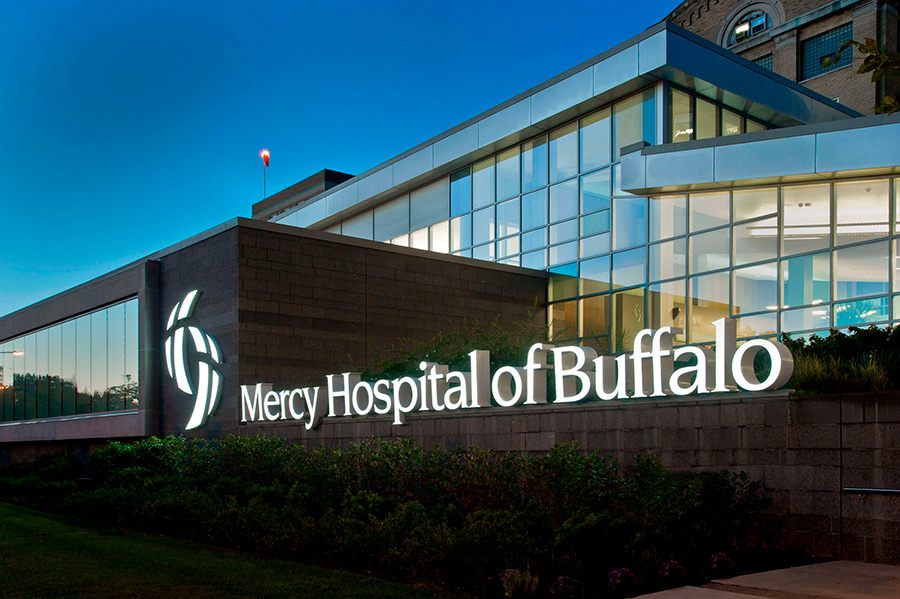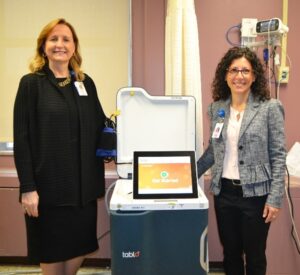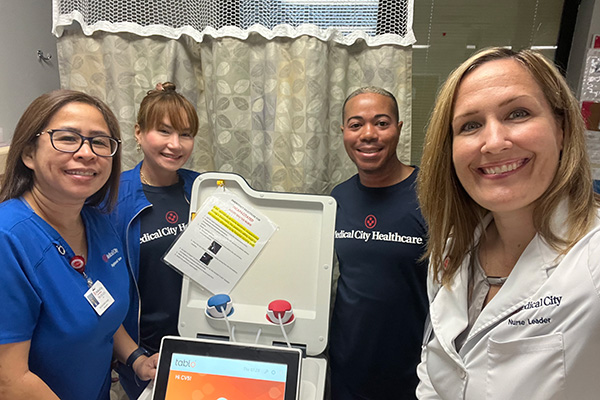Catholic Health Standardizes Dialysis and Cuts Costs with Tablo

Summary
This western New York health network recently brought all its acute dialysis care in-house and onto a single, simplified platform. It is now seeing an increase in treatment volume and a projected $500k in annual savings from standardizing supplies.
Catholic Health, a network of hospitals and other healthcare facilities across western New York, has been under pressure with a growing acute and chronic kidney disease (CKD) patient census. For years, the health system treated patients requiring dialysis using a mix of models including in-house traditional hemodialysis machines and outsourced services. Due to the high costs and other operational inefficiencies of this critical service line and in the midst of the COVID-19 pandemic, leadership put significant strategic changes into motion in 2021.
That September, the two largest hospitals in the network, Mercy Hospital of Buffalo and Sisters of Charity Hospital, became the first in the region to convert from a long-established but costly dialysis model to a program consisting solely of the first-of-its-kind Tablo® Hemodialysis System. This effort eliminated the need for several types of dialysis machines for different clinical needs, from dialysis unit to ICU, along with burdensome water treatment resources and associated supplies. Tablo, a clinically versatile system for standardized dialysis care, includes fully integrated water purification and dialysate on-demand and covers 95% of hospital dialysis treatments with durations up to 24 hours.
Catholic Health’s President and CEO (as of September 2023), formerly Executive Vice President and Chief Business Development Officer, Joyce Markiewicz, RN, BSN, MBA, CHCE, says that supply standardization is one of the biggest benefits they have seen since converting the two hospitals to Tablo.
“When we looked at the inventory that the teams were carrying for dialysis supplies, it varied from hospital to hospital, and a significant amount of supplies were sitting on the shelf. With Tablo, we have a standardized supply list across the organization, which is helpful for example if we need to share supplies across sites. Our calculations year-over-year are quite significant overall. We are looking at about half a million dollars a year of projected supply savings. And that’s not even including the cost of the supplies that we are no longer carrying.”
“We are looking at about half a million dollars a year of projected supply savings. And that’s not even including the cost of the supplies that we are no longer carrying.”
Leadership then began the process of moving two additional network hospitals, Kenmore Mercy and Mount St. Mary’s, to Tablo in December 2022. These two lower-volume dialysis facilities had been using a high-cost, contracted provider that halted its services after becoming aware that the hospitals were planning to change their dialysis model, leaving the staff and their patients without a treatment alternative. With training and support from Outset Medical and Mercy Hospital of Buffalo and Sisters Hospital nursing teams, the teams at Kenmore and Mount St. Mary’s were able to quickly launch their very first in-house Tablo dialysis service line at both sites.
Throughout all four Catholic Health acute care hospitals, a fleet of Tablo consoles are now providing a growing volume of dialysis treatments to the kidney disease population in the region. The pioneering technology is also planned to be a major part of the system’s future vision to provide dialysis in other settings, including home care, to meet the needs of patients and their families.
Innovation Drives Care Model Recalibration
Markiewicz first heard about Tablo a few years ago as CEO of Home and Community Based Services at Catholic Health. She has always been keenly interested in finding ways to treat patients in settings outside of the hospital. Recent health policy changes further highlighted the lack of innovation in end-stage renal disease and an urgent need for more patient-centered care.

“With the overarching changes taking place in kidney care, I was even more intrigued with the Tablo device, as it was designed to address so many of the challenges that we see in nephrology. It’s unique in that it runs off tap water, is compact, and convenient and easy to use in any setting,” she says. “As soon as Tablo was FDA-cleared for home use in 2020, making it a full hospital-to-home solution, we made a strategic plan to convert all of our hospitals onto a single in-house platform for dialysis.”
Christina Tobin, DHA, RN, OCN, NEA-BC, Vice President of Operations at Mercy Hospital of Buffalo, served as the clinical lead for the implementation of the Tablo acute dialysis program at Catholic Health.
“The portability and ease of use has enabled our nurses to deliver treatment outside the dialysis unit.”
“Tablo’s all-in-one capabilities offer significant benefits over our previous insourced and outsourced machines, improving comfort and convenience for patients while offering a safe, streamlined and cost-effective dialysis process for nurses and other caregivers,” she says. “The portability and ease of use has enabled our nurses to deliver treatment outside the dialysis unit. It is now easier to treat patients anywhere within our facility.”
Streamlined Training and Leadership Support
Tobin notes that the Tablo implementation process began in the midst of the COVID pandemic, and working with the nursing staff at each facility on setup and training, and with dedicated support from Outset Medical, team engagement and skill-building was accomplished successfully.
Nurses at the most recent implementation sites worked with already-trained nurses from Mercy Hospital and Sisters Hospital to quickly build their confidence in Tablo.
“We have been able to incorporate a lot of super-user ICU nurses to assist in the dialysis unit as needed,” says Markiewicz. “We were also able to find agency nurses to help with our nursing shortage who had used Tablo at other facilities, which was very valuable. Their skillset bought us some time so that we could train our own workforce, along with support from the Outset team. We were able to get our program up and running very quickly at those two sites.”
REQUEST A DEMO
Get in touch with us! We’d love to show off Tablo and learn more about your dialysis program.
“We were also able to find agency nurses to help with our nursing shortage who had used Tablo at other facilities, which was very valuable.”
“Our physicians can collaborate on prescriptions and use the same order sets,” adds Tobin. “Bringing on Tablo has provided Catholic Health with a lot of efficiencies that we didn’t have previously.”
The conversion also had strong executive team support. “Our Chief Clinical Officer and Chief Physician Executive, Dr. Hans Cassagnol, understands the value that the technology brings to the organization, and has been a real champion in support of our Tablo program,” says Markiewicz. “Two of our hospital Presidents, C.J. Urlaub at Mount St. Mary’s, and Walter Ludwig at Kenmore Mercy, both commented that this was the first time that their hospitals were able to provide this service directly with our own workforce, and that was a really big deal.”
The full in-house conversion to Tablo is part of a three-year strategic plan for Catholic Health, and a long-time aspiration for Markiewicz. “It started with successful launches across the acute setting, and next we plan to get closer to the patients in the community, and ultimately take it into the home care setting.”
ABOUT CATHOLIC HEALTH
Catholic Health is one of the largest providers of healthcare in Western New York State. Founded in Buffalo, NY, in 1998, it is the regional leader in quality and patient safety. Its continuum of care includes four hospitals on five campuses; four long-term care facilities; three home care agencies; and dozens of diagnostic, treatment, rehabilitation and specialty centers located throughout Erie and Niagara counties. An economic engine in the Buffalo-Niagara region, Catholic Health is one of the area’s largest employers, contributing more than $2 billion in economic benefit for the community at large and $126 million in community benefit. Its more than 9,000 associates and 1,500 physicians are part of a healing ministry dating back more than 170 years, including Buffalo’s first hospital.
Among its many services, Catholic Health is known for excellence in cardiovascular care, stroke care, women’s services, orthopedics, neuroservices, and rehabilitation, featuring Western New York’s only Joint Commission Comprehensive Stroke Center, a regional Heart Center and Neonatal Intensive Care Services.
Important Safety Information
Indication statement:
The Tablo® Hemodialysis System is indicated for use in patients with acute and/or chronic renal failure, with or without ultrafiltration, in an acute or chronic care facility. Treatments must be administered under physician’s prescription and observed by a trained individual who is considered competent in the use of the device. The Tablo Hemodialysis System is also indicated for use in the home. Treatment types available include Intermittent Hemodialysis (IHD), Sustained Low Efficiency Dialysis (SLED/ SLEDD), Prolonged Intermittent Renal Replacement Therapy (PIRRT), and Isolated Ultrafiltration.
Caution statement:
This device is not indicated for continuous renal replacement therapy (CRRT) and is cleared for use for up to 24 hours. The dialysate generated by this device is not sterile and should not be used for intravenous (IV) infusion.
Disclaimers:
Treatment and outcome results are specific to the individual patient. Patients should always discuss the potential risks, complications, and benefits of this product with a healthcare professional, prior to receiving treatment, and should rely on their physician’s judgment. Please review the product user manual prior to use for detailed instructions, indications, contraindications, warnings, precautions and disclosures, or call 1-844-MY TABLO (1-844-698-2254).
The views and opinions expressed herein represent the personal opinions of the facility staff, and do not represent the views or opinions of other persons, institutions or organizations.

